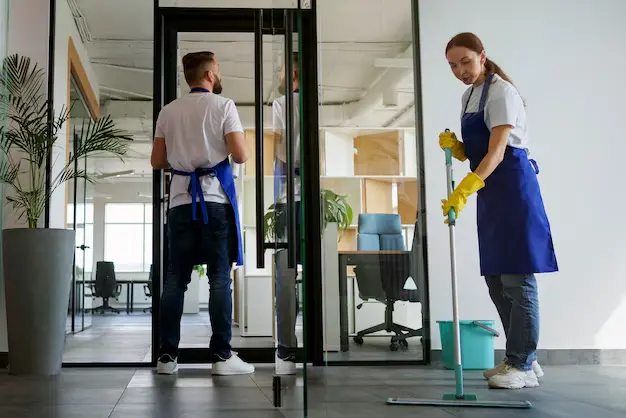Managing a business means juggling countless decisions every day. Some are big, some are small, but all of them matter when you’re trying to keep costs down and standards up.
One choice that’s been troubling business owners lately is whether to hire their own cleaning staff or bring in a contract cleaning service. It might seem like a simple decision on the surface, but there’s more to consider than you’d think.
The True Price of Hiring Your Own Cleaners
When you first think about employing cleaners directly, the math looks straightforward. You advertise for a cleaner, hire someone decent, pay them a fair wage, and Bob’s your uncle.
Except it’s never that simple, is it?
Start with the salary. Let’s say you find someone willing to work for £18,000 a year. That sounds reasonable until you remember the extras. National Insurance contributions bump that figure up. Then there’s pension auto-enrolment, statutory sick pay, and holiday entitlement.
Your £18,000 cleaner actually costs closer to £22,500 when you add everything up. And that’s before they’ve even picked up a mop.
Equipment is another expense people forget about. Industrial vacuum cleaners aren’t cheap. Professional cleaning products cost more than the stuff from Tesco. Storage space for all this gear takes up room you could be using for something more profitable.
Training takes time too. Health and safety courses, proper chemical handling, key holder responsibilities. Someone needs to organise all this, and that someone is probably you.
Why Smart Businesses Choose Professional Services
Contract cleaning companies handle the boring stuff so you don’t have to. No recruitment headaches, no payroll administration, no wondering if your cleaner will show up tomorrow.
They arrive with their own equipment and supplies. If their usual person is off sick, they send someone else. If you’re not happy with the work, they sort it out or lose your business.
The control issue worries some business owners. Will outsiders care as much about your premises as your own employees? Fair question, but consider this: their entire reputation depends on keeping you satisfied.
Quality assurance programmes at professional cleaning firms often exceed what most businesses could implement. These include regular inspections, customer feedback systems, and performance monitoring. Your in-house cleaner might develop bad habits when nobody’s watching.
Risks You Probably Haven’t Considered
Employment law is a minefield these days. If you hire someone directly, you’re responsible for all sorts of regulations, including discrimination claims, unfair dismissal cases, and workplace injury compensation.
Professional cleaning companies carry comprehensive insurance for these situations. They handle the legal compliance, the health and safety training, and the risk assessments.
There’s also the productivity angle. Your office manager shouldn’t be hoovering carpets because the cleaner didn’t turn up. Every minute spent on cleaning is not spent on whatever makes your business money.
When Keeping Things In-House Works Better
Some situations genuinely favour direct employment. High-security environments might need permanently vetted staff rather than rotating contract workers who change every few months.
Businesses with particular requirements sometimes find it easier to train their people properly rather than constantly explaining special procedures to different contractors.
Perhaps you’ve got unusual working hours that make contract services impractical. Or maybe your premises are so small that hiring your own person costs less than the minimum charge from cleaning companies.
The important thing is to be realistic about your situation rather than making decisions based on what you think other successful businesses do.
Statutory compliance becomes someone else’s headache when you use professional services. They stay current with changing regulations, new safety requirements, and industry standards. Your directly employed cleaner might not even know these things exist.
Finding the Right Solution for Your Business
Company size makes a big difference here. Small offices with basic needs often find professional services more economical. Larger operations with complex requirements might justify the overhead of permanent staff.
Think about your core business activities. If you’re running a marketing agency, do you want to become an expert in cleaning chemicals and employment law? Your time generates more value when focused on what you do best.
Flexibility matters, too, as business requirements change. Professional cleaning scales are easy to use when you need more or less service. Hiring and firing permanent employees involves much more hassle and potential costs.
Working Out the Numbers
Professional services give you predictable monthly costs. You know exactly what goes out each month, making budgeting straightforward. When they leave, direct employees can surprise you with overtime claims, equipment failures, and replacement costs.
Don’t just compare the prominent figures, though. Factor in your time, the insurance implications, and the value of guaranteed coverage. Many businesses discover that professional cleaning saves money once they account for everything properly.
Peace of mind has a hard-to-quantify value. Knowing your premises will definitely be cleaned tomorrow morning, regardless of personal circumstances affecting individual employees, removes one source of stress from running your business.
Making Your Decision
Choosing between professional cleaning and direct employment isn’t purely about money. It’s about risk management, operational flexibility, and where you want to invest your limited time and energy.
Most UK businesses find professional services offer better value and fewer complications. But your specific circumstances might be different, and that’s fine too.
Calculate the real costs of both options before deciding. Include everything, not just wages or service fees. Think about management time, insurance implications, and backup arrangements.
Your business needs a cleaning solution that works reliably without constant attention, leaving you free to focus on growth rather than wondering whether someone remembered to restock the toilet paper.



































